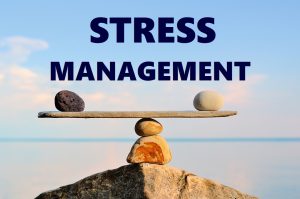Stress is an inevitable part of life, but prolonged exposure can have detrimental effects on mental and physical wellbeing. Learning how to effectively manage your stress by creating effective coping mechanisms will allow for a calmer lifestyle.
Stressful times require you to recognize this fact and seek assistance, and some find long-term talk therapy useful in managing their levels of anxiety.
1. Deep Breathing
Breathing exercises such as deep breathing are an effective means of relieving anxiety and stress. Learning these techniques quickly is straightforward, making them accessible almost anywhere you are located.
Stressful situations cause our bodies to react as though we’re in immediate danger, activating what’s known as the “fight-or-flight” response – heart rate increases, palms sweat and adrenaline surges through your system – something which is helpful if we are actually facing imminent danger but less ideal when everyday stresses come knocking.
Deep breathing techniques are an effective way to overcome this response by stimulating the parasympathetic nervous system and inducing relaxation.
2. Yoga
Yoga may bring to mind physically strenuous postures, but it’s actually an effective relaxation technique that activates brain networks associated with calmness to reduce stress levels while increasing mental strength and helping manage it more effectively.
Stress is unavoidable, but it’s essential to identify its warning signs in order to take appropriate actions to limit its escalation. These indicators may include tight muscles or headaches; anxiety or irritability symptoms or feeling of overwhelm.
Hobbies and leisure activities provide an important respite from everyday stressors, helping you unwind mentally. Try painting, gardening or playing music to recharge mentally.
3. Meditation
Meditation is a mental and physical practice that can reduce stress, increase psychological balance and manage chronic health conditions. At UC Davis Health, mindfulness and meditation classes include breathing exercises and visualization techniques designed to help participants relax.
Your body is designed with an instinctual “fight-or-flight” response designed to keep you safe. However, when everyday stress triggers this response repeatedly it can become problematic. Meditation helps break this negative stress cycle while improving focus. For maximum benefit meditate in a quiet setting.
4. Exercise
Although stress may seem inevitable, there are ways to manage it and minimize its impact. Some techniques involve altering behavior – for instance avoiding negative self-talk and eliminating sources of uncontrollable tension – while other therapies, like autoregulation exercises which promote deep breathing and muscular relaxation can also help.
Exercise can be an excellent way to relieve stress. Physical activity helps the body produce endorphins, which act as natural mood-lifters and help counteract the negative effects of stress hormones. To make physical activity a stress reliever, make regular physical activity part of your routine and choose activities you enjoy doing.
5. Nutrition
Food choices play an integral part in controlling stress levels. Selecting healthy options high in tryptophan (which increases serotonin), potassium (such as bananas and avocados) and fiber can help balance blood sugar levels while also supporting the body’s natural mechanisms against stress relief.
Understanding when your stress level has become out of hand can be difficult, but it is crucial that you recognize its signs and seek assistance before things spiral out of control. Stay away from unhealthy coping mechanisms like taking drugs to relax as this only adds further tension over time.
6. Sleep
Sleep is essential to emotional resilience and living a healthy lifestyle. Scheduling adequate restful restful can reduce stress levels and promote better moods.
Long-term stress management may require additional strategies, including effective time management strategies, relaxation techniques and seeking social support. Eating a diet rich in fruits, vegetables and lean proteins is also known to help stabilize energy levels and emotions; additionally, participating in hobbies or leisure activities provides a mindful distraction from daily stresses.
7. Relaxation Techniques
Relaxation techniques help ease muscle tension, lower blood pressure and control pain. They may be taught by health professionals or taught independently; examples include progressive muscle relaxation (PMR), autogenic training, guided imagery and meditation.
Encourage patients to experiment with various relaxation techniques until they find one that best meets their needs. Remind them that learning these techniques takes practice; aim to commit at least 10 minutes a day towards practicing them for best results. Just 10 minutes may help reduce stress levels and boost overall well-being!
8. Journaling
Journaling can provide you with an effective means of exploring your thoughts and emotions in a safe, private manner. Studies have proven that writing about challenging experiences can facilitate catharsis and healing.
Journaling can also help reduce rumination, the continuous cycle of thinking about negative events. However, it should be remembered that journaling should not serve as a replacement for therapy services.
Writing can help develop time management, concentration and self-awareness skills. Consider keeping a bullet journal to track goals and tasks or keeping a daily gratitude log to remain positive.
9. Connecting with Others
Engaging with friends, family members and trusted professionals is an excellent way to manage stress levels. Make an effort to check-in with people throughout their day and find out about what brings them joy. Take an interest in what interests others as you build connections with them.
Listening attentively and sincerely makes others feel valued, while online forums and meetup groups provide community.
If human interaction is challenging for you, seek assistance from a mental health professional. They will provide strategies and techniques to enhance your relationships and reduce stress levels for a happier lifestyle!
10. Hobbies and Leisure Activities
Pleasurable leisure activities provide individuals with a welcome respite from daily stressors, providing opportunities to pursue interests that promote relaxation, mindfulness and self-esteem. Hobbies such as astronomy and photography bring an air of awe while testing patience and creativity.
Hobbies can activate many health-boosting mechanisms at both micro and meso levels – impacting individuals directly – as well as at larger community scale. For instance, mobile photography enables personal expression while video editing fosters technical proficiency and social engagement (please refer to appendix for full list of potential mechanisms).




